Film Analysis: 12 Years a Slave - A Study of American History
VerifiedAdded on 2022/08/08
|6
|1334
|33
Essay
AI Summary
This film analysis examines Steve McQueen's '12 Years a Slave,' a period drama based on Solomon Northup's memoir. The analysis explores the film's central themes of freedom, slavery, and the importance of liberty and individualism within American culture and history. It highlights how the movie contrasts the lives of free and enslaved people, depicting the dehumanizing effects of slavery through Northup's experiences. The analysis also considers the film's historical accuracy, cinematic liberties, and the emotional impact of the narrative, emphasizing the importance of remembering and understanding the past to value human rights and freedom. The essay references key scenes and characters to illustrate the film's powerful message about the cost of liberty and the enduring legacy of slavery.
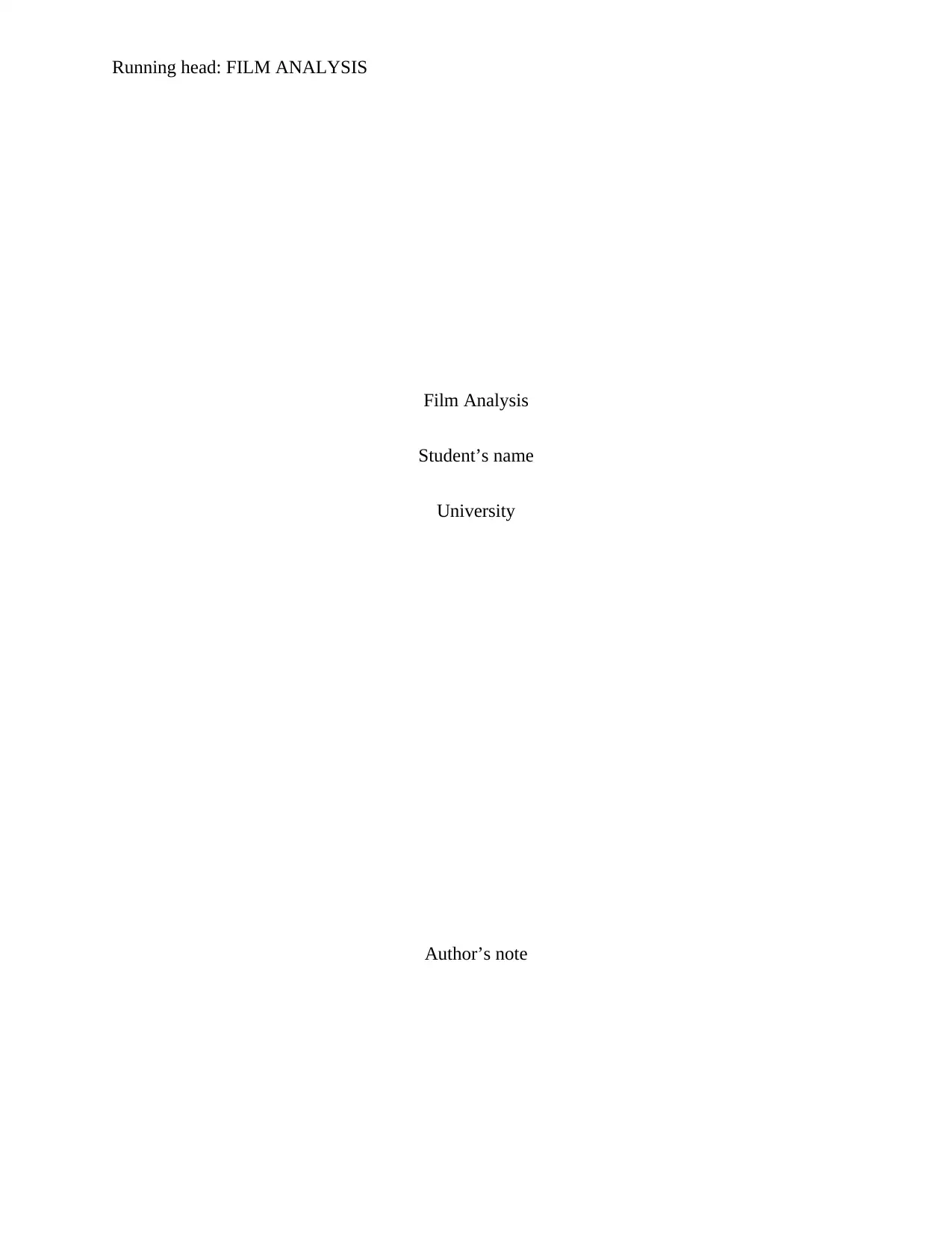
Running head: FILM ANALYSIS
Film Analysis
Student’s name
University
Author’s note
Film Analysis
Student’s name
University
Author’s note
Paraphrase This Document
Need a fresh take? Get an instant paraphrase of this document with our AI Paraphraser
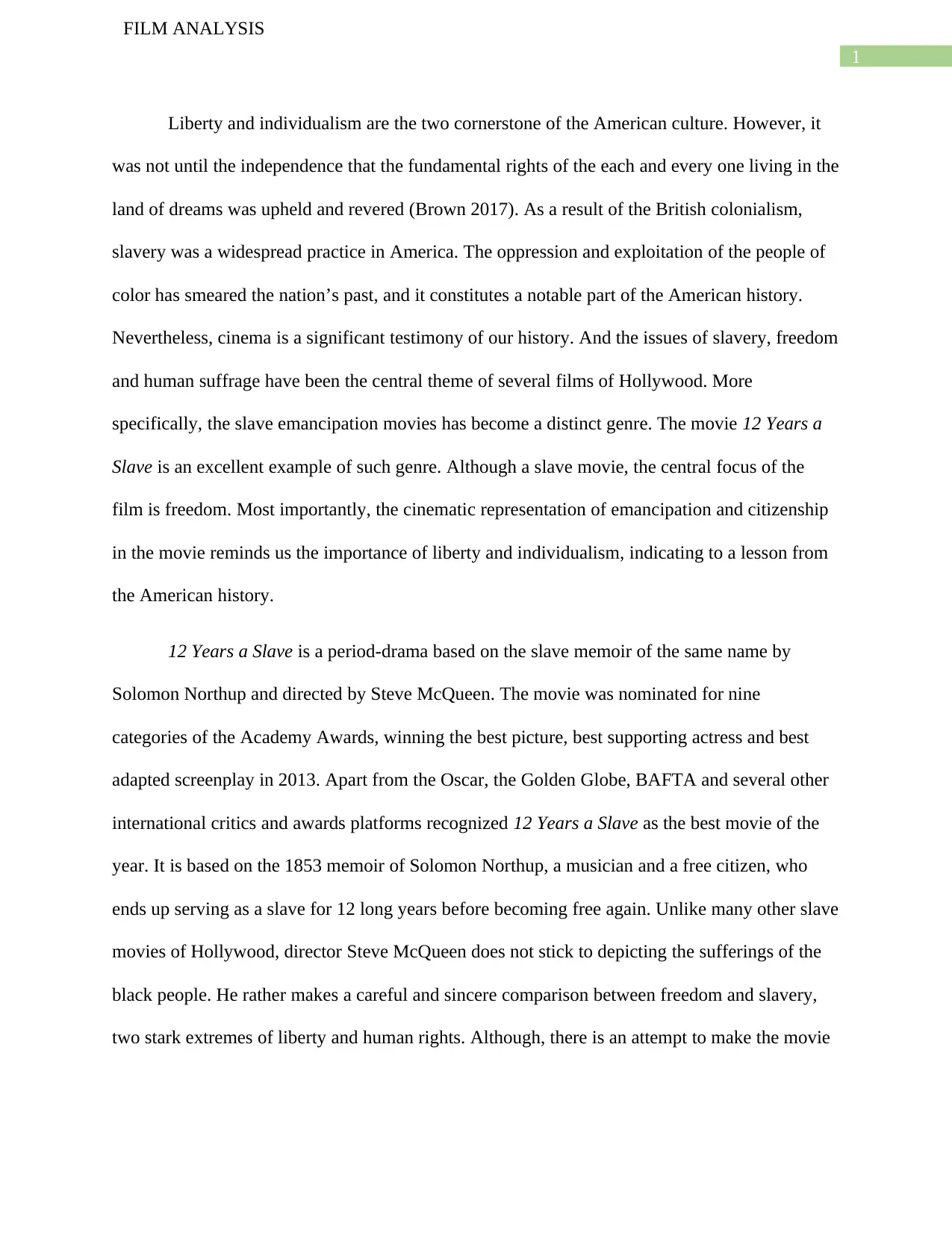
1
FILM ANALYSIS
Liberty and individualism are the two cornerstone of the American culture. However, it
was not until the independence that the fundamental rights of the each and every one living in the
land of dreams was upheld and revered (Brown 2017). As a result of the British colonialism,
slavery was a widespread practice in America. The oppression and exploitation of the people of
color has smeared the nation’s past, and it constitutes a notable part of the American history.
Nevertheless, cinema is a significant testimony of our history. And the issues of slavery, freedom
and human suffrage have been the central theme of several films of Hollywood. More
specifically, the slave emancipation movies has become a distinct genre. The movie 12 Years a
Slave is an excellent example of such genre. Although a slave movie, the central focus of the
film is freedom. Most importantly, the cinematic representation of emancipation and citizenship
in the movie reminds us the importance of liberty and individualism, indicating to a lesson from
the American history.
12 Years a Slave is a period-drama based on the slave memoir of the same name by
Solomon Northup and directed by Steve McQueen. The movie was nominated for nine
categories of the Academy Awards, winning the best picture, best supporting actress and best
adapted screenplay in 2013. Apart from the Oscar, the Golden Globe, BAFTA and several other
international critics and awards platforms recognized 12 Years a Slave as the best movie of the
year. It is based on the 1853 memoir of Solomon Northup, a musician and a free citizen, who
ends up serving as a slave for 12 long years before becoming free again. Unlike many other slave
movies of Hollywood, director Steve McQueen does not stick to depicting the sufferings of the
black people. He rather makes a careful and sincere comparison between freedom and slavery,
two stark extremes of liberty and human rights. Although, there is an attempt to make the movie
FILM ANALYSIS
Liberty and individualism are the two cornerstone of the American culture. However, it
was not until the independence that the fundamental rights of the each and every one living in the
land of dreams was upheld and revered (Brown 2017). As a result of the British colonialism,
slavery was a widespread practice in America. The oppression and exploitation of the people of
color has smeared the nation’s past, and it constitutes a notable part of the American history.
Nevertheless, cinema is a significant testimony of our history. And the issues of slavery, freedom
and human suffrage have been the central theme of several films of Hollywood. More
specifically, the slave emancipation movies has become a distinct genre. The movie 12 Years a
Slave is an excellent example of such genre. Although a slave movie, the central focus of the
film is freedom. Most importantly, the cinematic representation of emancipation and citizenship
in the movie reminds us the importance of liberty and individualism, indicating to a lesson from
the American history.
12 Years a Slave is a period-drama based on the slave memoir of the same name by
Solomon Northup and directed by Steve McQueen. The movie was nominated for nine
categories of the Academy Awards, winning the best picture, best supporting actress and best
adapted screenplay in 2013. Apart from the Oscar, the Golden Globe, BAFTA and several other
international critics and awards platforms recognized 12 Years a Slave as the best movie of the
year. It is based on the 1853 memoir of Solomon Northup, a musician and a free citizen, who
ends up serving as a slave for 12 long years before becoming free again. Unlike many other slave
movies of Hollywood, director Steve McQueen does not stick to depicting the sufferings of the
black people. He rather makes a careful and sincere comparison between freedom and slavery,
two stark extremes of liberty and human rights. Although, there is an attempt to make the movie
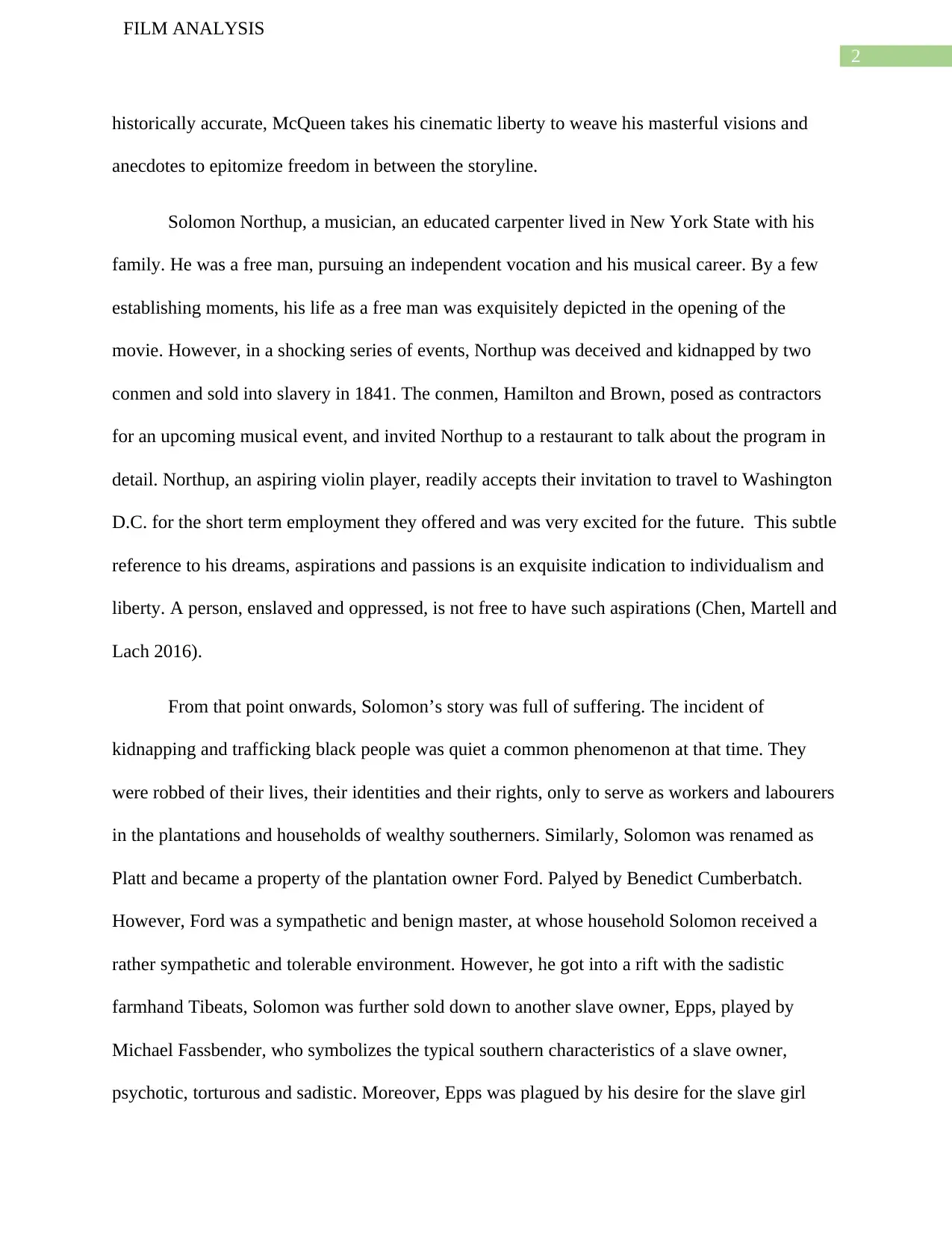
2
FILM ANALYSIS
historically accurate, McQueen takes his cinematic liberty to weave his masterful visions and
anecdotes to epitomize freedom in between the storyline.
Solomon Northup, a musician, an educated carpenter lived in New York State with his
family. He was a free man, pursuing an independent vocation and his musical career. By a few
establishing moments, his life as a free man was exquisitely depicted in the opening of the
movie. However, in a shocking series of events, Northup was deceived and kidnapped by two
conmen and sold into slavery in 1841. The conmen, Hamilton and Brown, posed as contractors
for an upcoming musical event, and invited Northup to a restaurant to talk about the program in
detail. Northup, an aspiring violin player, readily accepts their invitation to travel to Washington
D.C. for the short term employment they offered and was very excited for the future. This subtle
reference to his dreams, aspirations and passions is an exquisite indication to individualism and
liberty. A person, enslaved and oppressed, is not free to have such aspirations (Chen, Martell and
Lach 2016).
From that point onwards, Solomon’s story was full of suffering. The incident of
kidnapping and trafficking black people was quiet a common phenomenon at that time. They
were robbed of their lives, their identities and their rights, only to serve as workers and labourers
in the plantations and households of wealthy southerners. Similarly, Solomon was renamed as
Platt and became a property of the plantation owner Ford. Palyed by Benedict Cumberbatch.
However, Ford was a sympathetic and benign master, at whose household Solomon received a
rather sympathetic and tolerable environment. However, he got into a rift with the sadistic
farmhand Tibeats, Solomon was further sold down to another slave owner, Epps, played by
Michael Fassbender, who symbolizes the typical southern characteristics of a slave owner,
psychotic, torturous and sadistic. Moreover, Epps was plagued by his desire for the slave girl
FILM ANALYSIS
historically accurate, McQueen takes his cinematic liberty to weave his masterful visions and
anecdotes to epitomize freedom in between the storyline.
Solomon Northup, a musician, an educated carpenter lived in New York State with his
family. He was a free man, pursuing an independent vocation and his musical career. By a few
establishing moments, his life as a free man was exquisitely depicted in the opening of the
movie. However, in a shocking series of events, Northup was deceived and kidnapped by two
conmen and sold into slavery in 1841. The conmen, Hamilton and Brown, posed as contractors
for an upcoming musical event, and invited Northup to a restaurant to talk about the program in
detail. Northup, an aspiring violin player, readily accepts their invitation to travel to Washington
D.C. for the short term employment they offered and was very excited for the future. This subtle
reference to his dreams, aspirations and passions is an exquisite indication to individualism and
liberty. A person, enslaved and oppressed, is not free to have such aspirations (Chen, Martell and
Lach 2016).
From that point onwards, Solomon’s story was full of suffering. The incident of
kidnapping and trafficking black people was quiet a common phenomenon at that time. They
were robbed of their lives, their identities and their rights, only to serve as workers and labourers
in the plantations and households of wealthy southerners. Similarly, Solomon was renamed as
Platt and became a property of the plantation owner Ford. Palyed by Benedict Cumberbatch.
However, Ford was a sympathetic and benign master, at whose household Solomon received a
rather sympathetic and tolerable environment. However, he got into a rift with the sadistic
farmhand Tibeats, Solomon was further sold down to another slave owner, Epps, played by
Michael Fassbender, who symbolizes the typical southern characteristics of a slave owner,
psychotic, torturous and sadistic. Moreover, Epps was plagued by his desire for the slave girl
⊘ This is a preview!⊘
Do you want full access?
Subscribe today to unlock all pages.

Trusted by 1+ million students worldwide
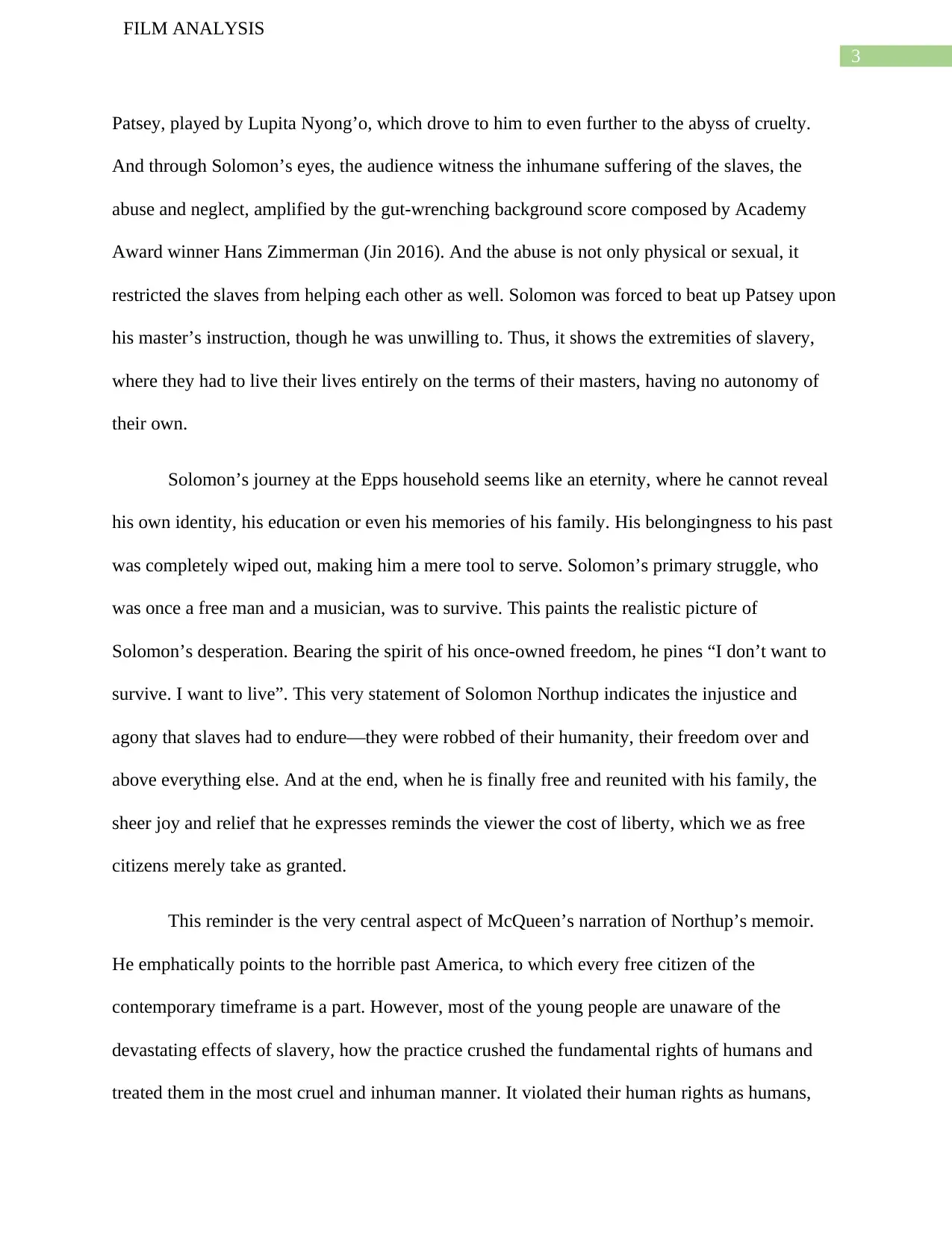
3
FILM ANALYSIS
Patsey, played by Lupita Nyong’o, which drove to him to even further to the abyss of cruelty.
And through Solomon’s eyes, the audience witness the inhumane suffering of the slaves, the
abuse and neglect, amplified by the gut-wrenching background score composed by Academy
Award winner Hans Zimmerman (Jin 2016). And the abuse is not only physical or sexual, it
restricted the slaves from helping each other as well. Solomon was forced to beat up Patsey upon
his master’s instruction, though he was unwilling to. Thus, it shows the extremities of slavery,
where they had to live their lives entirely on the terms of their masters, having no autonomy of
their own.
Solomon’s journey at the Epps household seems like an eternity, where he cannot reveal
his own identity, his education or even his memories of his family. His belongingness to his past
was completely wiped out, making him a mere tool to serve. Solomon’s primary struggle, who
was once a free man and a musician, was to survive. This paints the realistic picture of
Solomon’s desperation. Bearing the spirit of his once-owned freedom, he pines “I don’t want to
survive. I want to live”. This very statement of Solomon Northup indicates the injustice and
agony that slaves had to endure—they were robbed of their humanity, their freedom over and
above everything else. And at the end, when he is finally free and reunited with his family, the
sheer joy and relief that he expresses reminds the viewer the cost of liberty, which we as free
citizens merely take as granted.
This reminder is the very central aspect of McQueen’s narration of Northup’s memoir.
He emphatically points to the horrible past America, to which every free citizen of the
contemporary timeframe is a part. However, most of the young people are unaware of the
devastating effects of slavery, how the practice crushed the fundamental rights of humans and
treated them in the most cruel and inhuman manner. It violated their human rights as humans,
FILM ANALYSIS
Patsey, played by Lupita Nyong’o, which drove to him to even further to the abyss of cruelty.
And through Solomon’s eyes, the audience witness the inhumane suffering of the slaves, the
abuse and neglect, amplified by the gut-wrenching background score composed by Academy
Award winner Hans Zimmerman (Jin 2016). And the abuse is not only physical or sexual, it
restricted the slaves from helping each other as well. Solomon was forced to beat up Patsey upon
his master’s instruction, though he was unwilling to. Thus, it shows the extremities of slavery,
where they had to live their lives entirely on the terms of their masters, having no autonomy of
their own.
Solomon’s journey at the Epps household seems like an eternity, where he cannot reveal
his own identity, his education or even his memories of his family. His belongingness to his past
was completely wiped out, making him a mere tool to serve. Solomon’s primary struggle, who
was once a free man and a musician, was to survive. This paints the realistic picture of
Solomon’s desperation. Bearing the spirit of his once-owned freedom, he pines “I don’t want to
survive. I want to live”. This very statement of Solomon Northup indicates the injustice and
agony that slaves had to endure—they were robbed of their humanity, their freedom over and
above everything else. And at the end, when he is finally free and reunited with his family, the
sheer joy and relief that he expresses reminds the viewer the cost of liberty, which we as free
citizens merely take as granted.
This reminder is the very central aspect of McQueen’s narration of Northup’s memoir.
He emphatically points to the horrible past America, to which every free citizen of the
contemporary timeframe is a part. However, most of the young people are unaware of the
devastating effects of slavery, how the practice crushed the fundamental rights of humans and
treated them in the most cruel and inhuman manner. It violated their human rights as humans,
Paraphrase This Document
Need a fresh take? Get an instant paraphrase of this document with our AI Paraphraser

4
FILM ANALYSIS
robbing of their autonomy, human rights and belongingness (Jones 2015). Thus, the movie is the
most exquisite memoir of slavery, reminding us the value of freedom and human rights.
FILM ANALYSIS
robbing of their autonomy, human rights and belongingness (Jones 2015). Thus, the movie is the
most exquisite memoir of slavery, reminding us the value of freedom and human rights.
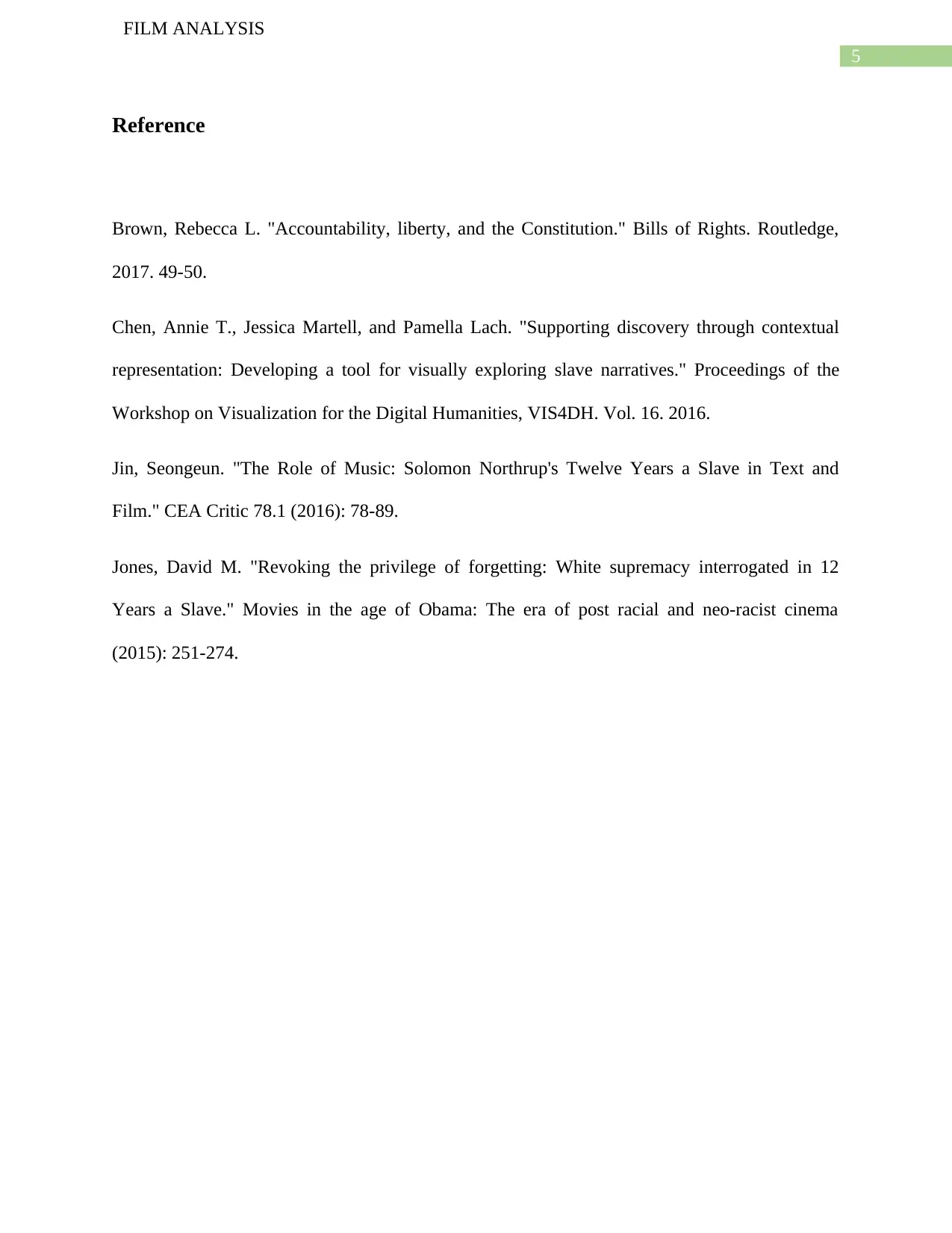
5
FILM ANALYSIS
Reference
Brown, Rebecca L. "Accountability, liberty, and the Constitution." Bills of Rights. Routledge,
2017. 49-50.
Chen, Annie T., Jessica Martell, and Pamella Lach. "Supporting discovery through contextual
representation: Developing a tool for visually exploring slave narratives." Proceedings of the
Workshop on Visualization for the Digital Humanities, VIS4DH. Vol. 16. 2016.
Jin, Seongeun. "The Role of Music: Solomon Northrup's Twelve Years a Slave in Text and
Film." CEA Critic 78.1 (2016): 78-89.
Jones, David M. "Revoking the privilege of forgetting: White supremacy interrogated in 12
Years a Slave." Movies in the age of Obama: The era of post racial and neo-racist cinema
(2015): 251-274.
FILM ANALYSIS
Reference
Brown, Rebecca L. "Accountability, liberty, and the Constitution." Bills of Rights. Routledge,
2017. 49-50.
Chen, Annie T., Jessica Martell, and Pamella Lach. "Supporting discovery through contextual
representation: Developing a tool for visually exploring slave narratives." Proceedings of the
Workshop on Visualization for the Digital Humanities, VIS4DH. Vol. 16. 2016.
Jin, Seongeun. "The Role of Music: Solomon Northrup's Twelve Years a Slave in Text and
Film." CEA Critic 78.1 (2016): 78-89.
Jones, David M. "Revoking the privilege of forgetting: White supremacy interrogated in 12
Years a Slave." Movies in the age of Obama: The era of post racial and neo-racist cinema
(2015): 251-274.
⊘ This is a preview!⊘
Do you want full access?
Subscribe today to unlock all pages.

Trusted by 1+ million students worldwide
1 out of 6
Your All-in-One AI-Powered Toolkit for Academic Success.
+13062052269
info@desklib.com
Available 24*7 on WhatsApp / Email
![[object Object]](/_next/static/media/star-bottom.7253800d.svg)
Unlock your academic potential
Copyright © 2020–2025 A2Z Services. All Rights Reserved. Developed and managed by ZUCOL.

